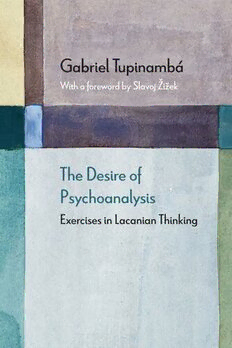
The Desire of Psychoanalysis PDF
Preview The Desire of Psychoanalysis
THE DESIRE OF PSYCHOANALYSIS Series Editors Slavoj Žižek Adrian Johnston Todd McGowan diaeresis T H E D E S I R E O F P S Y C H O A N A LY S I S Exercises in Lacanian Thinking Gabriel Tupinambá Northwestern University Press Evanston, Illinois Northwestern University Press www .nupress .northwestern .edu Copyright © 2021 by Northwestern University Press. Published 2021. All rights reserved. Printed in the United States of America 10 9 8 7 6 5 4 3 2 1 Library of Congress Cataloging- in- Publication Data Names: Tupinambá, Gabriel, author. | Žižek, Slavoj, writer of foreword. Title: The desire of psychoanalysis : exercises in Lacanian thinking / Gabriel Tupinambá ; [foreword by Slavoj Žižek]. Other titles: Diaeresis. Description: Evanston, Illinois : Northwestern University Press, 2021. | Series: Diaeresis | Includes bibliographical references and index. Identifiers: LCCN 2020036848 | ISBN 9780810142817 (paperback) | ISBN 9780810142824 (cloth) | ISBN 9780810142831 (ebook) Subjects: LCSH: Lacan, Jacques, 1901– 1981. | Psychoanalysis. Classification: LCC BF173 .T843 2021 | DDC 150.195— dc23 LC record available at https://lccn.loc.gov/2020036848 To Luisa: “. . . only there may the signification of an infinite love emerge” Contents Acknowledgments ix Foreword For Lacan, against Lacanian Ideology, by Slavoj Žižek xi Introduction 3 1 Psychoanalysis and Politics after 2017 9 2 The Basis of Lacanian Ideology 25 3 The History of an Impasse in Lacanian Thinking 58 4 The Generic Perspective in Psychoanalysis 75 5 The Political Economy of Clinical Practice 96 6 The Form of the Other and Its Institutional Enclosure 120 7 Groundwork for a Metapsychology of Ideas 139 8 The Idea of the Passe 176 Conclusion 219 Notes 229 Works Cited 249 Index 259 Acknowledgments I cannot say that the ideas in this book are really mine: they gradually formed and sedimented while I was entertained having long discussions with friends, usually about other things. To thank all of these generous interlocutors would be impossible, so I would like to name just a few of them, in the hope that everyone else with whom I share similar bonds might feel equally recognized: Clara Tupinambá, Yuan Yao, Srdjan Cvjeticanin, Agon Hamza, Cindy Zeiher, Daniel Tutt, Jeniffer Bello, Rodrigo Gonsalves, Jean-P ierre Caron, and Reza Naderi. At the same time, I would never have realized the importance of what emerged in our conversations if it were not for some insistent problems that troubled me for years, and which endowed these ideas with their rele- vance. These are impasses that I learned to face and endure, rather than merely avoid, only because I was not alone. For this, I would like to thank those who sought analysis with me—and those with whom I sought my own analysis—as well as my comrades in the Circle of Studies of Idea and Ideology—among them, my dear and departed friend Fernando Fagundes Ribeiro. I would also like to thank Slavoj Žižek and Alenka Zupančič, both of whom paved the way for much of what is written here. Finally, without the support of my family—and, especially, without Luisa in my life—I would never have had the courage to engage with this am- bitious project, much less the serenity to recognize how little of it I can actually take credit for. ix
